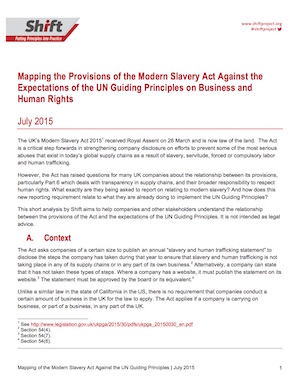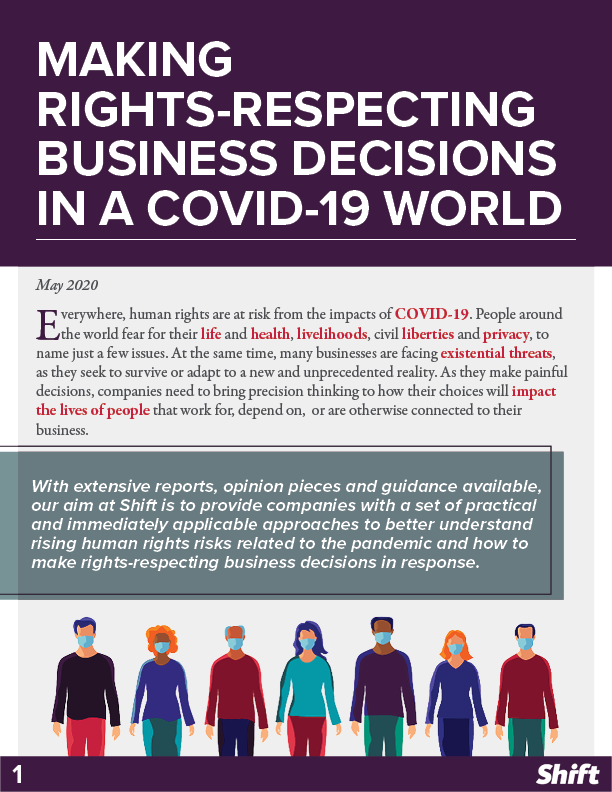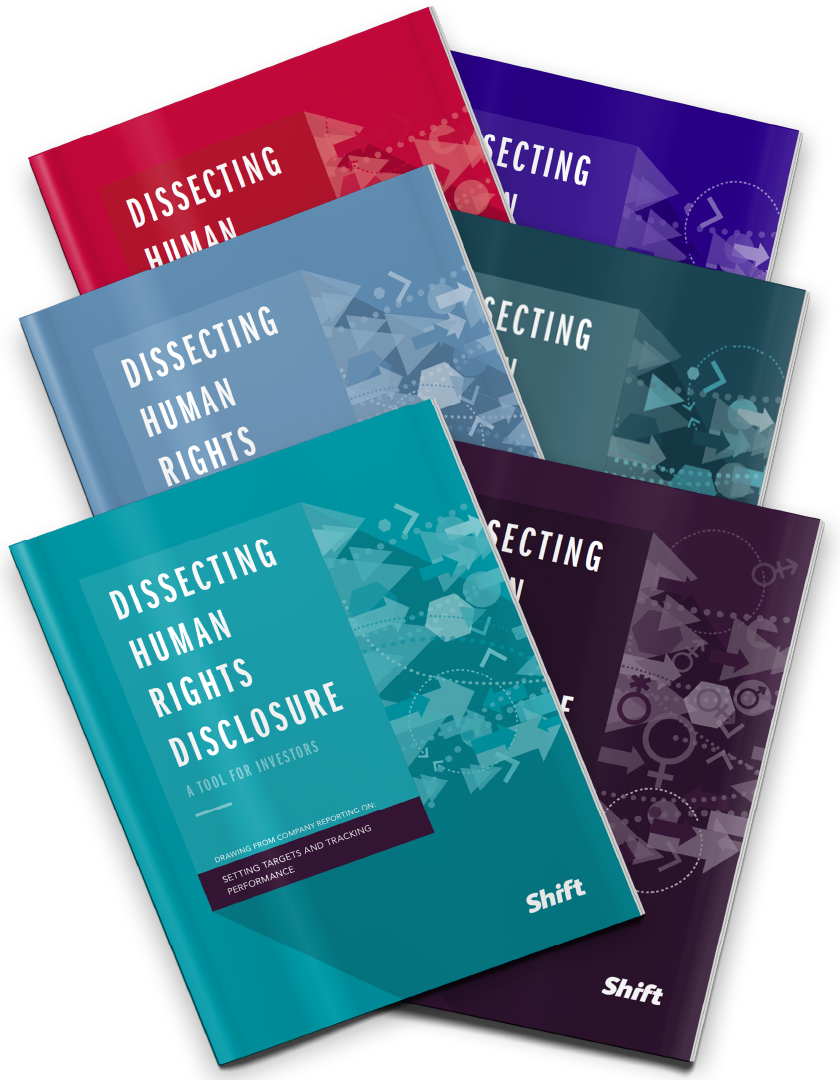The UK’s Modern Slavery Act 2015 received Royal Assent on March 26, 2015. The Act is a critical step forwards in strengthening company disclosure on efforts to prevent some of the most serious abuses that exist in today’s global supply chains as a result of slavery, servitude, forced or compulsory labor and human trafficking.
However, the Act has raised questions for many UK companies about the relationship between its provisions, particularly Part 6, which deals with transparency in supply chains, and their broader responsibility to respect human rights. What exactly are they being asked to report on relating to modern slavery? And how does this new reporting requirement relate to what they are already doing to implement the UN Guiding Principles?
This short analysis by Shift aims to help companies and other stakeholders understand the relationship between the provisions of the Act and the expectations of the UN Guiding Principles. It is not intended as legal advice.
1. Context
The Act asks companies of a certain size to publish an annual “slavery and human trafficking statement” to disclose the steps the company has taken during that year to ensure that slavery and human trafficking is not taking place in any of its supply chains or in any part of its own business (Section 54(4)). Alternatively, a company can state that it has not taken these types of steps. Where a company has a website, it must publish the statement on its website (Section 54(7)). The statement must be approved by the board or its equivalent (Section 54(6)). Unlike a similar law in the state of California in the US, there is no requirement that companies conduct a certain amount of business in the UK for the law to apply. The Act applies if a company is carrying on business, or part of a business, in any part of the UK.
The law applies to a significant number of companies. In line with the general view expressed by both business and civil society stakeholders during the public consultation on this point, the Government announced on July 29 that the law applies to any company with an annual turnover of £36 million – the lowest of the proposed turnover thresholds. As a result, the Act applies to an estimated 12,000 UK active companies; that is more than the number that will be subject to the new EU non-financial reporting directive that is being transposed into UK law this year.
2. Analyzing the Modern Slavery Act through the Lens of the UN Guiding Principles
So what are UK companies that are subject to the Act being asked to do? Section 54(5) provides that a company’s statement “may include” the following:
- the organization’s structure, its business and its supply chains;
- its policies in relation to slavery and human trafficking;
- its due diligence processes in relation to slavery and human trafficking in its business and supply chains;
- the parts of its business and supply chains where there is a risk of slavery and human trafficking taking place, and the steps it has taken to assess and manage that risk;
- its effectiveness in ensuring that slavery and human trafficking is not taking place in its business or supply chains, measured against such performance indicators as it considers appropriate;
- the training about slavery and human trafficking available to its staff.
The text is, admittedly, potentially confusing for those trying to assess its requirements against the expectations of the UN Guiding Principles. But in essence, paragraph (a) asks for critical context to enable a reader to understand the business; the remainder of the provisions reflect expectations set out under the UN Guiding Principles and apply them to the risks of slavery and human trafficking in a company’s own operations and in its supply chain. This is consistent with the UN Guiding Principles, which expect companies to seek to prevent or mitigate negative human rights impacts that are directly linked to their operations, products or services through their business relationships, even if they have not caused or contributed to those impacts.
In short, companies are being asked to disclose:
- Evidence of a policy commitment in relation to slavery and human trafficking, as well as evidence of the effectiveness of the embedding of this policy specifically through training provided to staff;
- The company’s human rights due diligence processes in relation to slavery and human trafficking in its operations and supply chains. This includes:
- Identifying the parts of a company’s operations and supply chains where the risks of such impacts are the most salient, that is, where they would be the most severe in terms of the impact on people, were they to occur, and where they are the most likely to occur;
- Explaining the steps a company has taken to assess and manage those risks and the effectiveness of its efforts, which are all parts of human rights due diligence as set out in the UN Guiding Principles.
The law does not specifically refer to information about companies’ remediation processes where negative impacts have taken place and the company has caused or contributed to them. (Remediation is the third element, together with a policy commitment and human rights due diligence processes, that the UN Guiding Principles expect companies to have place to meet their responsibility to respect human rights in practice.) However, the list of relevant information in Section 54(5) is non-exhaustive.
So companies can rest assured: the law does not introduce anything new. It is not asking for additional information beyond that which is already covered by the UN Guiding Principles. Rather, the Act is asking for evidence of specific policies and processes to prevent and address slavery, human trafficking and related severe impacts.
3. The Relationship between the Modern Slavery Act and Broader Human Rights Reporting
Companies and their stakeholders can now benefit from the UN Guiding Principles Reporting Framework – the first comprehensive guidance for companies to report on human rights in alignment with the UN Guiding Principles – in their efforts to meet the requirements of the Modern Slavery Act.
The table below illustrates the connections between the information asked for under the Act and the guidance provided in the UNGP Reporting Framework.
| Modern Slavery Act, s 57 | UNGP Reporting Framework |
|---|---|
5(a) Information about an organization’s structure, business and supply chains |
|
5(b) Information about an organization’s polices on modern slavery | Relevant information is contained under Question C1. |
5(c) Information about an organization’s due diligence processes in relation to modern slavery in its business and supply chains | Relevant information is contained under Questions C2 through C5. |
5(d) Information about the parts of an organization’s business and its supply chains where there is a risk of modern slavery taking place, and the steps it has taken to assess and manage that risk | Relevant information is contained under Questions C2 through C5. |
5(e) Information about an organization’s effectiveness in ensuring that modern slavery is not taking place in its business or supply chains, measured against such performance indicators as it considers appropriate | Relevant information is contained under Questions C2 through C5. |
5(f) Information about the training on modern slavery available to its staff | Relevant information is contained under Question C1.1. |
The UNGP Reporting Framework provides additional resources on how companies can enhance the credibility of their disclosure in relation to their efforts to prevent and address risks related to slavery, human tracking and related impacts, particularly in terms of stakeholder engagement (see C2) and remediation (see C6).
Companies that use the UNGP Reporting Framework for their human rights reporting more generally, and for which slavery, human trafficking or related impacts are a salient human rights issue, will already have addressed the Act’s disclosure requirements by addressing the provisions of the Reporting Framework indicated above. In this way, companies’ disclosure on their efforts to prevent and address these severe impacts can become part of a broader, more coherent approach to human rights reporting.




